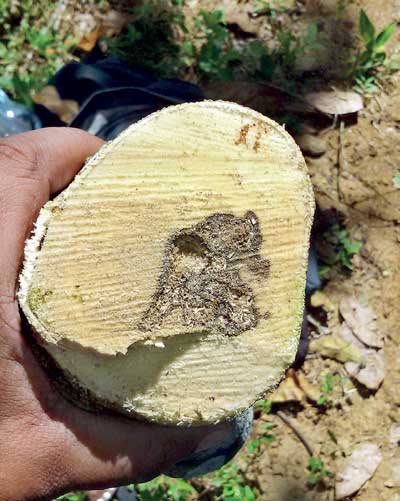01 Mar 2017 - {{hitsCtrl.values.hits}}

Although Sri Lanka is very rich in natural resources including a significant amount of natural forests, their utilisation should have been restricted for the sake of conservation so that the generations to come in future can utilise them in a sustainable manner.
However, strict conservation does not generate a considerable financial return for the country’s economy and therefore looking for alternatives while protecting the environment and soil has become a priority. In such circumstances, an achievement of the financial goals through commercial forestry can be sought as one of the viable investments in today’s economic platform. Thereby one can also reap the benefits from exporting the timber or non-timber forest products while preserving the country’s environment.
Considering the demand in the international market for some forestry-based products, one could easily earn a higher return on investing in proper forestry-related activities. This inevitably becomes investing in a greener future, conservation of nature and biodiversity of Sri Lanka.
The main objective of commercial forestry, which was implemented in 1950, was to fulfil the timber requirement of the country. Due to the high demand of timber in the local market, plantation owners have not been able to export timber to fulfil the international requirements. Low pricing of timber in the local market is the biggest issue in the forestry industry in the country. In contrast, high market opportunity has been opened up mainly for non-timber forest products such as sandalwood and agarwood in the international market.
Agarwood at present is considered to be the most viable investment in the non-timber forest products sector, which could generate shorter turnaround time of harvest, becoming popular as a green investment in today’s economy. In contrast to the biggest challenge that the timber industry faces due to the long turnaround time, which could be over 15 to 20 years to extract timber to earn profits, non-timber forest products such as agarwood would be able to reduce the turnaround period considerably.
Recently, the leading perfume manufacturers in the world recognized agarwood oil as a base to formulate perfumes. Therefore, the demand for agarwood oil has now spread from the Middle-East market to the European market showing an increased growth on demand-over-supply. It is therefore becoming a viable investment opportunity. Analysing the global demand statistics for agarwood-based by-products, at present the Far East Asian suppliers have only been able to fulfil 40 percent of the market demand.
If the plantations of agarwood are raised and products are manufactured, the future export market of Sri Lanka will be highly benefitted. In addition, the satisfaction gained by contributing to the conservation of nature by growing forests and preserving the valuable biodiversity will be immense.
(Dr. Upul Subasinghe has been conducting research on forest management from 1995. Since 2009, he has been researching on non-timber forest products, especially on aromatic products such as agarwood and sandalwood. He is a Senior Lecturer at the Forestry and Environmental Science Department of the University of Sri Jayewardenepura specializing in Forest and Forest Plantation Management, Forest Certification and Natural Resource Modelling. Apart from the publications in international journals and proceedings, he presented research findings at various international conferences including International Sandalwood Symposium in Hawaii, International Scientific Symposium on Agarwood in Malaysia, International Conference in Agarwood in Taiwan and International Seminar on Sandalwood in Bangalore, India)
09 Jan 2025 1 hours ago
09 Jan 2025 3 hours ago
09 Jan 2025 3 hours ago
09 Jan 2025 3 hours ago
09 Jan 2025 4 hours ago